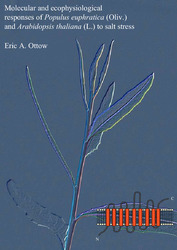| Departments | |
|---|---|
| Book Series (96) |
1381
|
| Nachhaltigkeit |
3
|
| Gesundheitswesen |
1
|
| Humanities |
2370
|
| Natural Sciences |
5408
|
| Mathematics | 229 |
| Informatics | 319 |
| Physics | 980 |
| Chemistry | 1364 |
| Geosciences | 131 |
| Human medicine | 243 |
| Stomatology | 10 |
| Veterinary medicine | 108 |
| Pharmacy | 147 |
| Biology | 835 |
| Biochemistry, molecular biology, gene technology | 121 |
| Biophysics | 25 |
| Domestic and nutritional science | 45 |
| Agricultural science | 1005 |
| Forest science | 201 |
| Horticultural science | 20 |
| Environmental research, ecology and landscape conservation | 148 |
| Engineering |
1795
|
| Common |
98
|
|
Leitlinien Unfallchirurgie
5. Auflage bestellen |
|
Advanced Search
Molecular and ecophysiological responses of Populus euphratica (Oliv.) and Arabidopsis thaliana (L.) to salt stress (English shop)
Eric Aart Ottow (Author)Preview
Table of Contents, Datei (64 KB)
Extract, Datei (85 KB)
Populus euphratica (Oliv.) is capable of growth in saline environments. However, little is known on the molecular and ecophysiological traits of its salt resistance. The aim of the present investigation was to gain new insights into the strategies of P. euphratica to cope with elevated NaCl concentrations. Laboratory experiments with young P. euphratica plants revealed that Na + was primarily accumulated in leaves and roots while the stems were less affected. Severe salt stress caused a complete die-back of the salt-sensitive poplar hybrid Populus x canescens but did not injure P. euphratica despite accumulation of nearly 4% Na + in its leaves. X-ray microanalyses showed that apoplastic rather than vacuolar salt accumulation was the primary strategy to protect the cytosol against Na + toxicity. The ability to cope with salinity was also associated with the maintenance of cytosolic K + concentrations. Salt exposure induced development of leaf succulence due to an increase in cell number and cell volume, thus contributing to Na + resistance by dilution the salt concentration.
| ISBN-13 (Printausgabe) | 3865373798 |
| ISBN-13 (Hard Copy) | 9783865373793 |
| ISBN-13 (eBook) | 9783736913790 |
| Language | German |
| Page Number | 156 |
| Edition | 1 |
| Volume | 0 |
| Publication Place | Göttingen |
| Place of Dissertation | Göttingen |
| Publication Date | 2005-03-06 |
| General Categorization | Dissertation |
| Departments |
Biology
Forest science |








